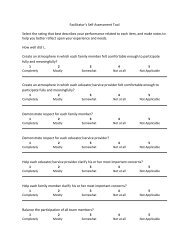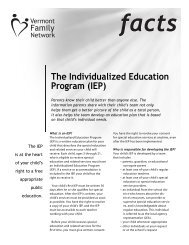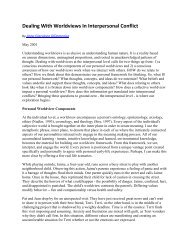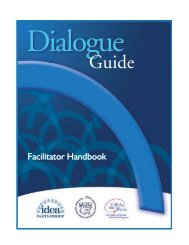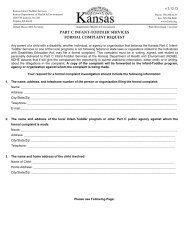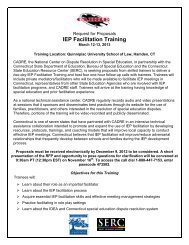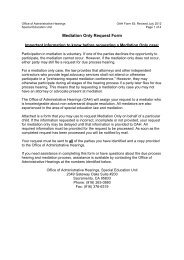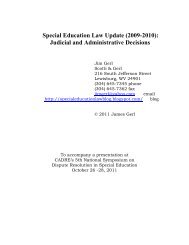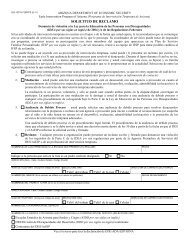Special Education Due Process Hearings and ... - Direction Service
Special Education Due Process Hearings and ... - Direction Service
Special Education Due Process Hearings and ... - Direction Service
Create successful ePaper yourself
Turn your PDF publications into a flip-book with our unique Google optimized e-Paper software.
<strong>Special</strong> <strong>Education</strong> <strong>Due</strong> <strong>Process</strong> <strong>Hearings</strong> <strong>and</strong> Alternative Dispute Resolution<br />
FAQs<br />
Page – 2 –<br />
What are the steps to resolving a complaint?<br />
1. After receiving your letter, it will be reviewed by the Complaints office of the Bureau of <strong>Special</strong><br />
<strong>Education</strong>.<br />
2. If the issues are appropriate for the complaint procedures, then:<br />
a. An independent investigator is assigned to the case.<br />
b. A courtesy telephone call is made to the school district’s director of special education<br />
stating that a complaint has been filed telling them who filed the complaint <strong>and</strong> what it is<br />
about <strong>and</strong> what federal <strong>and</strong>/or state regulations are involved.<br />
c. A letter is sent to both the complainant <strong>and</strong> the school district giving them the name of the<br />
investigator, a copy of the complaint letter <strong>and</strong> identifying what federal <strong>and</strong>/or state<br />
regulations are involved.<br />
3. If necessary, the person filing the complaint may contact the complaint officer <strong>and</strong> may correct<br />
any errors made in summarizing the issues.<br />
4. The investigator will review appropriate educational records <strong>and</strong> interview both the parents <strong>and</strong><br />
school district officials <strong>and</strong> staff to determine the facts. When the investigation is complete, the<br />
investigator will submit a written report to NHDOE.<br />
5. The NHDOE Complaints officer will review the report <strong>and</strong> issue a decision based upon the<br />
investigator’s finding of fact <strong>and</strong> the relevant state <strong>and</strong> federal rules <strong>and</strong> regulations.<br />
6. The Commissioner of <strong>Education</strong> reviews the decisions <strong>and</strong> makes a determination of what<br />
corrective action, if any, is warranted. The Commissioner signs the decision. The decision will be<br />
issued no later than 60 days after the complaint was received by NHDOE. The timeline may be<br />
extended if the Department determines that exceptional circumstances exist that delay the<br />
decision.<br />
7. If any party is aggrieved by the decision, he or she has 10 days from the date the decision was<br />
received to request reconsideration. Within 20 days of receiving a request for reconsideration, the<br />
Commissioner will determine whether reconsideration is merited <strong>and</strong> will issue a final<br />
determination. Any party still aggrieved may request a due process hearing or file an appeal in<br />
accordance with Ed 200.<br />
How is a complaint investigation different from a due process hearing?<br />
A due process hearing is a formal administrative hearing before an impartial hearing officer. The parties to a<br />
hearing have an opportunity to present <strong>and</strong> cross-examine witnesses, to have a record of the proceedings,<br />
<strong>and</strong> to enter <strong>and</strong> object to evidence. Parties can subpoena witnesses <strong>and</strong> testimony is under oath. <strong>Due</strong><br />
process hearings provide for detailed due process rights. The final order can be appealed to state or federal<br />
court. The court will look at the hearing record, along with the final order. The IDEA includes an attorney<br />
fees provision so that parents who prevail in an administrative hearing may ask the court to order<br />
reimbursement for reasonable attorney fees.<br />
The complaint process is an informal review of the situation by NHDOE staff <strong>and</strong> independent investigators.<br />
The investigators will review the paperwork, talk to parents <strong>and</strong> school staff, <strong>and</strong> look to see whether the<br />
school district's actions comply with the IDEA. There is no formal testimony or record of the proceedings.<br />
There are no oaths, subpoenas or other due process protections.



